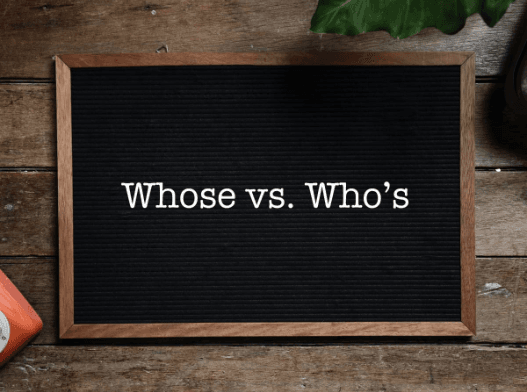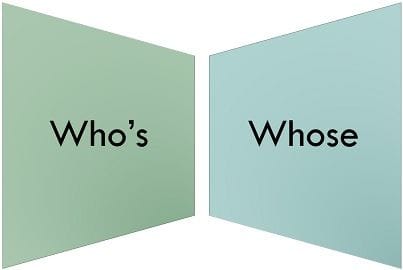Mastering Pronoun Precision: The Ultimate Guide to Who's vs Whose
Contents

Navigating English can be difficult for non-native speakers. Let's take a common situation: Imagine you're writing an email about a colleague. Now, should you write, "Who's the owner of the document?" or "Whose is the document?" It's easy to get confused between who's and whose.
In India, where we use many languages daily, this confusion with English is normal. We might hesitate before sending an email or making a presentation because of doubts about who's and whose.
This guide will clear up the who's vs whose confusion. With simple explanations and examples for Indian learners, you'll understand the who's vs whose meaning. Let's tackle who's vs whose grammar together, so you can communicate without hesitation. Stay tuned for more!
Understanding 'Who's'
'Who's', in the English language, is a contraction—an abbreviation of "who is" or "who has". This contraction is used when talking about someone doing something or possessing something. Each time you think about using 'who’s', substitute it with 'who is' or 'who has' to check if your sentence still makes sense.
For example, consider the sentence “Who's coming to the cricket match tonight?" Here, 'who’s' means 'who is'. Now let’s look at another example: "Who's got the tickets for the movie?" In this case, 'who’s' stands for 'who has'.
Understanding 'Whose'
Let's move on to 'whose'. It's a possessive pronoun that shows ownership or association. It asks to whom a thing or person belongs and is commonly used in questions.
Imagine you found an umbrella at the bus stop and want to know who it belongs to. You'd most likely ask, “Whose umbrella is this?" Here, you're using ‘whose’ correctly to inquire about ownership. Another example could be: "Whose idea was it to order butter chicken for dinner?" In this case, you're asking about the originator of an idea.
Comparison: Who’s vs Whose
Let's take a closer look at the two terms, 'Who's' and 'Whose'. They may sound similar but their meanings and usage are quite different. Here's a handy table to understand the who's vs whose meaning:
Term | Meaning | Usage | Example |
Who's | Contraction of 'who is' or 'who has' | Commonly used to refer to an individual or ask about identity. It is also used for present perfect constructions. | Who’s going to lead the project? |
Whose | Used to indicate possession. | It asks about ownership of something by someone. | Whose laptop did you borrow? |
Common Mistakes with Who’s and Whose:
Here are some common mistakes often made by English learners:
Misunderstanding the contraction "Who's" as indicating possession, instead of being short for "who is" or "who has".
Example:
Incorrect - "Who's bag is this?"
Correct - "Whose bag is this?"
Confusing the use of “Whose” as a question word with it meaning “of whom”.
Example:
Incorrect - “I don’t know whose he is talking.”
Correct - “I don’t know who's (who is) talking.”
These mix-ups can be avoided with practice and understanding how to use who's vs whose in a sentence. There are many similar confusing words in English. Here are some Clapingo blogs that might be helpful to you:
Mastering 'Who's' and 'Whose': Practical Tips and Tricks

Understanding the difference between 'who’s' and 'whose' can be tricky. Here are some tips to help you:
Remember that 'who's' is a contraction of "who is" or "who has". So when you want to say "Who is there?", you could also say "Who's there?".
'Whose' indicates possession. It’s similar to “his”, “her” or “their”. For example, you could ask "Whose book is this?".
Keep up with your who's vs whose practice until it feels natural. Try swapping out 'who is' and 'who has' with 'who’s', and ‘his’, ‘her’ or ‘their’ with ‘whose’ in a sentence as part of your practice.
For more English tips and tricks, check out Clapingo's YouTube channel.
Overcoming Challenges with 'Who's' vs 'Whose' in India
Misusing similar-sounding words like "who's" and "whose" is a common problem for Indian English learners. These words sound almost the same, leading to confusion. But understanding the difference between "who's" and "whose" can greatly improve your English fluency.
Here's an easy trick: "Who's" means "who is" or "who has," as in "Who's going to the market?" On the other hand, "Whose" shows ownership, like in "Whose phone is this?"
Mixing up these words can mess up your grammar and cause communication problems. But don't worry! Clapingo offers personalized coaching with native English speakers. You'll get clear explanations and who's vs whose examples and practice exercises to master these tricky words.
The Bottomline
We've unravelled the mystery surrounding 'who's' and 'whose'. To recap, 'who's' is simply a contraction of 'who is' or 'who has', while 'whose' is a possessive pronoun showing ownership. For instance, in the sentence "Who's coming to the party?" 'Who's' stands for 'who is'. Conversely, in "Whose car is this?", 'whose' signifies ownership of the book.
The path to mastery lies in consistent who's vs whose practice. Try using these terms in your conversations or written communications and observe how others use them.
Remember, learning any language takes time and patience. In the grand scheme of perfecting English, understanding the difference between 'who's vs whose' is a crucial step forward.
Continue this journey with Clapingo to refine your English skills further.
Frequently Asked Questions:
1. What is the difference between 'Who's' and 'Whose'?
"Who's" is a contraction of "who is" or "who has," used in questions and sentences. For example, "Who's coming to the meeting?" On the other hand, "Whose" is a possessive pronoun, used to show ownership or relationship. For example, "Whose book is this?"
2. Can you give examples of 'Who's' vs 'Whose' in a sentence?
Sure, here are some who's vs whose examples:
Who's (Who is): "Who's responsible for this presentation?"
Who's (Who has): "Who's got the new project details?"
Whose: "Whose pen is this on the table?"
3. When should I use 'Who's' and when should I use 'Whose'?
Use "Who's" when you want to say "who is" or "who has." Use it in questions or statements where you are asking about someone’s actions or status. Conversely, use "Whose" when you want to identify ownership or relationships between people.
You may want to read
11 Of The Best Apps For Improving Your English Speaking Skills
Comments
Your comment has been submitted